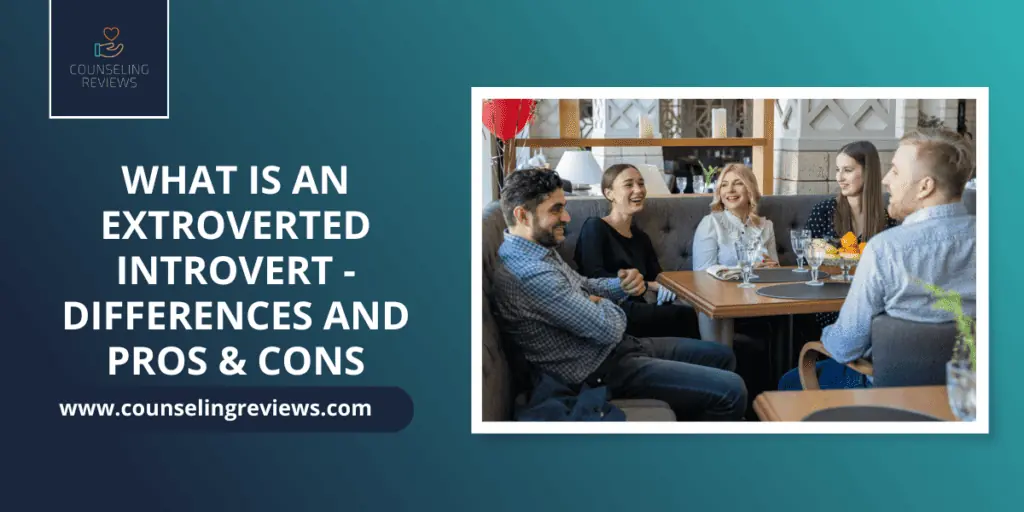An extroverted introvert, also known as an ambivert, demonstrates characteristics of both an extrovert and an introvert.
Carl Jung, the famous psychiatrist of the early 1900s, coined the terms introvert and extrovert to describe two distinctive features of personality. While Jung perceived these personality traits as somewhat fluid and belonging to a spectrum, he believed most people tend to favor either an introverted or extroverted disposition.
Introverts share the following characteristics:
- Prefer intimate gatherings over large crowds
- Appreciate alone time
- Prefer not to be the center of attention
- Self-aware
- Observant
- Restore their energy with solitude
Extroverts are described as having the following characteristics:
- Enjoy having a large network of friends
- Enjoy being the center of attention
- Make friends easily
- Might overlook social cues (may not be as observant as an introvert)
- Restore energy by being around others

Is an introverted extrovert different from an extroverted introvert and how?
Though it may seem like semantics, an introverted extrovert is different than an extroverted introvert. An introverted extrovert is someone who gravitates towards being social, but on occasion, requires solitude to recharge their energy. An extroverted introvert is drawn to solitude most of the time but will periodically crave social interaction.
What is an ambivert?
The Latin prefix “ambi” means both sides. An ambivert, therefore, is someone who exhibits both introverted and extroverted qualities. While some people land on either end of the personality spectrum of socialization and solitude, ambiverts land comfortably in the middle.
What are the pros and cons of being an ambivert?
Ambiverts can be viewed as having an advantage over those who primarily fall into being an introvert or an extrovert because they can easily adapt to being in either a social or an isolated situation.

Ambivert Pros
Leadership skills: Ambiverts can exhibit good leadership skills. Since they understand introverts and extroverts well, they have the ability to lead both with confidence. As a leader, they feel comfortable in the spotlight and they are also secure enough to allow others an opportunity to enjoy attention. As good listeners, they can determine what their team’s needs are and get things done accordingly.
Empathetic: Ambiverts use their empathy to connect with others and to understand situations better.
Good Listener: Ambiverts are good listeners and can understand the micro and meta messages people attempt to convey.
Flexible: Ambiverts are comfortable in a variety of different situations. Whereas a true introvert might feel most comfortable in intimate social situations, an ambivert will likely feel comfortable in crowds just as easily as they do in one-on-one situations.
Intuitive: Ambiverts are known to be intuitive and tend to make decisions based on their intuition.
Ambivert Cons
Difficulty knowing how to restore their energy: Since they are open to so many different social dynamics, when ambiverts do feel overwhelmed and in need of restoration, their internal navigation system can sometimes spin out of control. They may not have a good handle on when being in solitude would restore their energy and vice versa.
Indecisive: It can be hard to choose introverted or extroverted activities. When you are open to more experiences, you have more choices to make. With every choice comes an opportunity cost, and this is where ambiverts can sometimes get stuck.
May take on too many obligations or projects: Ambiverts may say yes to a lot of things while they are feeling extroverted and later regret those obligations when they feel the need to retreat.
May struggle with life direction: Similar to being indecisive, ambiverts may feel challenged to pick one career or goal. For instance, an extrovert is unlikely to become a data processor because it is an isolating profession. Whereas an ambivert might consider this career, knowing they can handle bouts of isolation.
How common are ambiverts?
Surprisingly, ambiverts make up the majority of personality traits. According to Barry Smith, professor emeritus and the director of the Laboratories of Human Psychophysiology at the University of Maryland, “ambiverts make up to 68% of the population.”
Signs you may be an ambivert
- You are willing to take a risk, however, you do so with a lot of preparation and forethought.
- You are flexible in a variety of situations and can adapt accordingly.
- You work well alone and you work well on a team.
- You enjoy being in the spotlight and you are also happy to take a back seat.
- You have good listening skills.
- You are observant of others and their behaviors.
- You may feel enlivened by social situations yet you may have to limit them for optimal energy.
- You don’t believe the introverted or extroverted category accurately describes your personality traits.
Things you need to know if you have an ambivert personality type
Flexibility is typically valued as being a positive, however, flexibility also means you will have more choices to make. If you find yourself paralyzed by choice, remember to really hone in on what will be best for you in the moment. For example, while the choice of a party might seem appealing, taking the night off to recuperate might be more beneficial if you are already feeling spent from a social week.
Conclusion
No matter what type of personality style you have, certain situations will bring out extroverted or introverted aspects of personality. As an ambivert, you have the grace and skills to participate comfortably in a variety of different situations. While no one personality type reigns supreme, being an ambivert certainly has its advantages.





